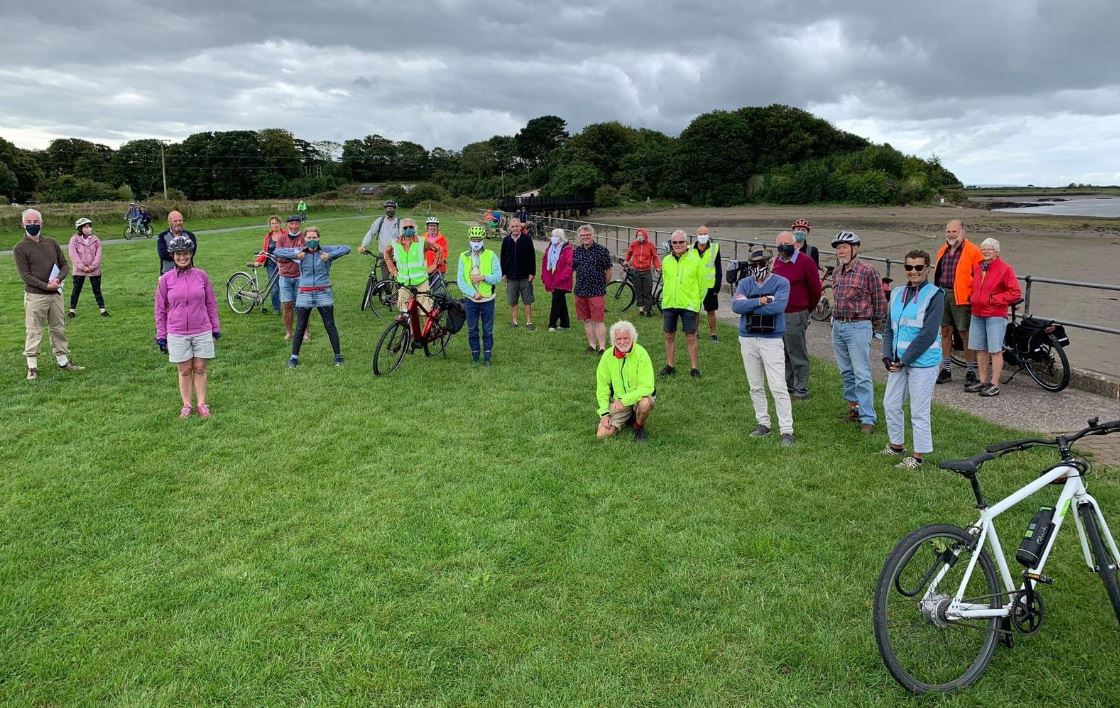MP’s view: Selaine Saxby talks budgeting effectively for cycling’s growth
Though largely a year to forget, in 2020 cycling moved beyond the headlines and became more of a political talking point. In this instalment of our MP’s View series, Selaine Saxby, co-chair of the All Party Parliamentary Cycling and Walking Group shares her thoughts on the road ahead…
Selaine Saxby joined the push to get cycling on the political agenda only at the last general election. The councillor and Conservative MP for North Devon hadn’t long entered the political arena, having most recently retrained as a mathematics teacher.
 The fit was a natural one, however. A fitness instructor of 20 years, Saxby has always held a passion for keeping people active. Coming to Government at a time when the green agenda has begun to make regular headlines, Saxby’s thinking aligns well with policy on everything from Transport to Environment.
The fit was a natural one, however. A fitness instructor of 20 years, Saxby has always held a passion for keeping people active. Coming to Government at a time when the green agenda has begun to make regular headlines, Saxby’s thinking aligns well with policy on everything from Transport to Environment.
“When Flick Drummond stood down it seemed a good time to step in. I’m a big advocate of meeting our carbon emissions goals and with my background as a fitness instructor I can see clear ways that we can begin to address the challenges with transport shifts. Active transport has been beamed into the spotlight this year and this administration is genuinely committed to pushing this change,” starts Saxby.
There is a nod to Boris Johnson’s role in bringing to fruition the bike hire scheme while mayor of London, something for which his name became attached despite some claiming it was an idea that had begun to take root under his predecessor Ken Livingstone. Cycling Commissioner Andrew Gilligan at the time dismissed this and the ‘Boris bike’ was born, seeding the idea that Johnson had the cyclists’ back. Since he became Prime Minister, cycling campaigners would tend to argue that the sentiment hasn’t carried as much weight as many had hoped.
“I really hate to mention Brexit, but the truth of the matter is the previous administration had other things holding us back as a nation to contend with. With a defined path coming into view the opportunity now to progress what’s really important comes to the fore and the ten-point plan to build around a green economy is in the spotlight. The Active Travel Fund of 250 million has backed this up,” says Saxby.
Addressing the value of the cash put up and indeed the varied localised progress attributed to the Active Travel Fund we ask whether the rollout of this cash has been a success.
“I think everyone always wants more money, it’s fair to say. I agree with Ruth Cadbury (interviewed in CI.N’s final issue of 2020) that we must make sure this money is well invested and the benefits seen, then it becomes easier to justify further funding. I would like to see the investment come through rapidly in order that we can show off the changes that have been made and can continue to make. It’s crucial to be able to demonstrate usage and preferable to be able to put it in the context of carbon reduction also. In my mind this process is a steppingstone to something larger. More money might be needed, but we’ve seen the world change unexpectedly too, so likewise we can see other things can happen to bring about that change without reliance on funding.”

It is acknowledged with some regret that progressing active travel initiatives has not been plain sailing in many parts. In Saxby’s locality, a far cry from London’s bustling centre, local schemes have failed to take root in the face of the ‘noisy minority’. Such was the level of abuse, we’re told, that the local council felt unable to proceed. What to do, then, about this all too prevalent trend?
“As with everything in politics it’s unusual everyone is in favour, so it’s important to understand the objections. It should be recognised that people are generally reluctant to embrace change. Very often those shouting loudest are not the ones most impacted by the incoming change. In North Devon lots of noise cancelled our infrastructure rollout, but I’m hoping we can learn from it anyway, to listen to the objections and present schemes better next time, in advance of roll out and with good explanation. There will always be people against new ideas, but the feeling is that the mood becomes more positive as time goes on when it comes to active travel provision. That said, I think it’s important to provide balance. The builder can’t get to work with tools without a van, so it’s not one mode against another. As other methods are made more environmentally friendly we need to focus on efficiency across the board.”
While tradesman can and increasingly do use bikes for carting up to 250 kilos of cargo from site to site it’s fair to say the critical mass is a long way off yet. To get us closer to a lesser reliance on vans subsidies have been rolled out on a small scale, with the Energy Saving Trust extending an initial grant deadline in the first quarter of 2020 in the face of high demand for the £1.2 million funding pool. As part of this, local authorities were able to bid for as much as £200,000 for the purchase of electric cargo bikes for use within their communities.
Saxby explains that while subsidies can be welcome as a kickstart for certain ideas, they are not always the answer and, in the present climate of low stocks of bikes, wouldn’t necessarily be welcomed by all.
“Often there are unintended consequence of subsidies. It is difficult at this time when a shortage of bikes exists to have these conversations with good foresight. If people are buying these bikes anyway then a subsidy is not useful to businesses. Sometimes these things can move forwards on their own momentum. A subsidy can kickstart a trend, but it’s not a long term answer,” she explains.
It is pointed out that the Cycle to Work scheme exists to provide a lower cost entry for new cyclists, albeit in a form that doesn’t necessarily satisfy all parties. It is described as “a victim of its own success,” by Saxby, who adds that “I certainly wouldn’t be adverse to a review if problems with the scheme do need addressing.”
The conditions for trading on the scheme have arguably become more favourable with the widespread lifting of the £1,000 ceiling. This has undoubtedly helped electric bikes hit new heights and Saxby sings their praises for helping people cope with the Devon topography, as well as opening the door to longer journeys. Ultimately, they could hold the key to prompting less reliance on the car for all journeys.
“It is important to think about these things in terms of local geography,” says Saxby, adding “What works for a city like London may show similarities in Manchester, but work differently in Exeter. You need to be fit to conquer some of the hills round here, so the e-Bike could be key for my constituency.”
In mentioning Manchester praise is given to the work Cycling and Walking commissioner Chris Boardman who “has been fantastic at raising the profile,” believes Saxby. “People recognise him as a household name and he speaks professionally, addressing people’s concerns directly, which is effective at helping drive change.”
Unfortunately, at the time of writing, no information exists on the creation of Active Travel England and the recruitment process ahead, but Saxby confirms the intention is to push forwards in the not too distant future.
At the time of writing the Brexit seesaw had not yet settled, but there is hope of some revival of British business whatever the outcome. Perceived as a growth sector, Saxby expresses excitement about what could be for the bike industry.
“Demand is currently outstripping supply, so there is a real opportunity for British companies to step in to that gap and build British where we can. Via the Kickstart scheme we can get 18 to 24-year-olds trained up and brought into the market with 25 hours a week of their wages paid for the employer,” says Saxby. The scheme in question requires the prospective student to be on Universal Credit. Employers of all sizes can apply, with 25 hours a week worth in wages paid for the first six months. A Kickstart Scheme application must be for a minimum of 30 job placements.
So, what can bike shops do to drive cycling on to the transport agenda with their MP and local authority?
Saxby concludes: “You’ll know customer and I expect have all the data on who is cycling near your shop. This is all useful information in your campaign. I’d hate to suggest more burdens on businesses than they have already, but this is very useful. MPs would be delighted to hear from businesses with thoughts, ideas and evidence that helps form a case for providing for cycling. It’s worth bearing in mind that a lot of funding decisions are taken at council level, as opposed to by the MP, but we can help.
“As a final word, I’d like to thank you for what you have done during the pandemic. You’ve been key workers keeping the nation moving.”



